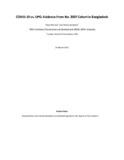| dc.contributor.author | Rahman, Atiya | |
| dc.contributor.author | Bandiera, Oriana | |
| dc.coverage.spatial | Bangladesh | en |
| dc.date.accessioned | 2022-07-28T10:14:21Z | |
| dc.date.available | 2022-07-28T10:14:21Z | |
| dc.date.issued | 2021-03-24 | |
| dc.identifier.citation | Rahman, A. and Bandiera, O. (2021) 'COVID-19 vs. UPG: Evidence From the 2007 Cohort in Bangladesh', Working Paper, Dhaka: BRAC Institute of Governance and Development (BIGD) | en |
| dc.identifier.uri | https://opendocs.ids.ac.uk/opendocs/handle/20.500.12413/17581 | |
| dc.description.abstract | The COVID-19 pandemic has had far-reaching economic consequences beyond the spread of the disease
itself, leading to a huge increase in poverty around the world. While most people have been affected by
the disruption in social and economic activities, the poorest and the most vulnerable households in low income countries have experienced the hardest hit. According to the World Bank (2021), COVID-19
pushed between 119 and 124 million people into extreme poverty in 2020 and 154 million by 2021, the
largest share (about 50%) of whom resides in South Asia. The effect of COVID-19 on extreme poverty is
two-pronged—the pandemic made it more difficult for the extreme poor to come out of the poverty
trap while pushing some of the vulnerable non-poor below the extreme poverty line. This is particularly
pronounced in countries like Bangladesh, where an additional 22.9% of the population fell below the
poverty line (Rahman et al., 2020).
In normal condition, BRAC’s flagship graduation approach aiming to alleviate poverty was proven to be
highly successful at giving the poorest women in some of the poorest areas of Bangladesh the tools to
escape the poverty trap (Balboni et al., 2021; Bandiera et al., 2017). Pilots of the UPG program have
shown that its effectiveness can be replicated in diverse settings (Banerjee et al., 2015; Banerjee et al.,
2018). The question we tackle here is whether these improvements are robust to systemic shocks such
as COVID-19. Our paper investigates the impact of the pandemic on the 2007 cohort of beneficiaries of
BRAC’s Ultra-Poor Graduation (UPG) program in rural areas of Bangladesh. | en |
| dc.language.iso | en | en |
| dc.publisher | BRAC Institute of Governance and Development (BIGD) | en |
| dc.rights.uri | https://www.ids.ac.uk/wp-content/uploads/2021/05/Latest_IDSOpenDocsStandardTermsOfUse_CC_BY.pdf | en |
| dc.subject | Health | en |
| dc.title | COVID-19 vs. UPG: Evidence From the 2007 Cohort in Bangladesh | en |
| dc.type | Other | en |
| dc.rights.holder | BRAC Institute of Governance and Development (BIGD) | en |
| dc.identifier.externaluri | https://bigd.bracu.ac.bd/publications/covid-19-vs-upg-evidence-from-the-2007-cohort-in-bangladesh/ | en |
| rioxxterms.funder | Department for International Development, UK Government | en |
| rioxxterms.identifier.project | Covid Collective | en |
| rioxxterms.version | VoR | en |
| rioxxterms.funder.project | 77b8f9cf-5d96-4012-a396-c9b3f6712d70 | en |

